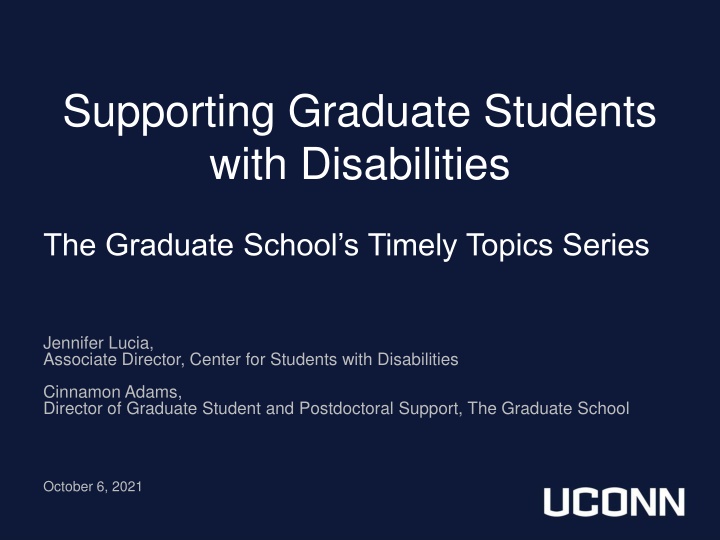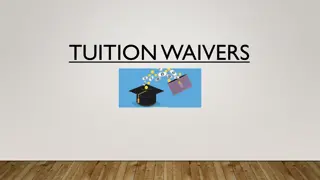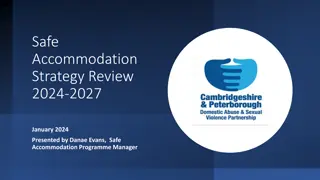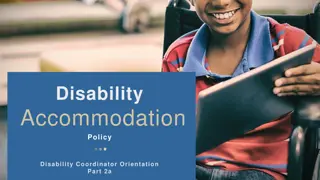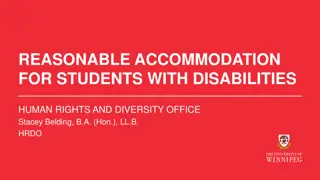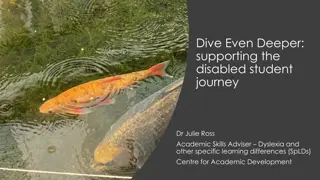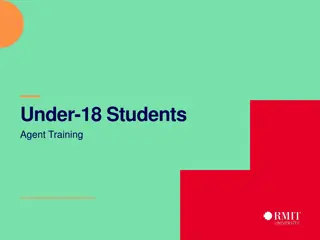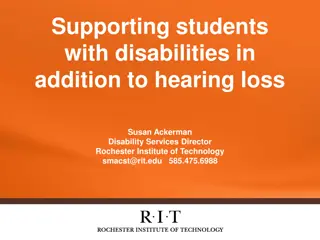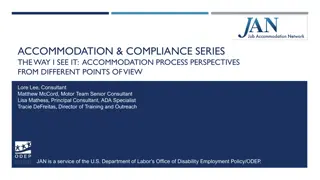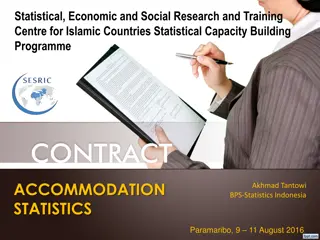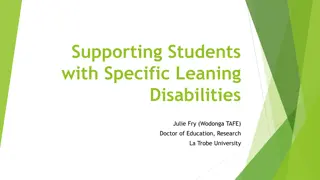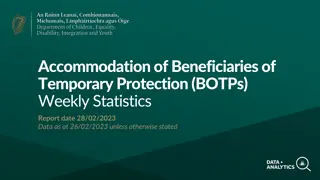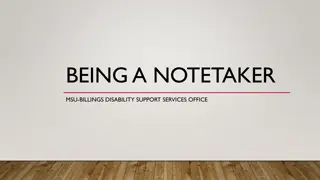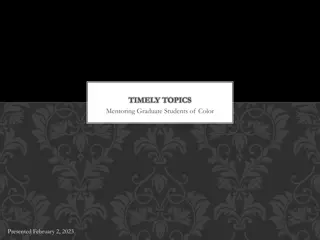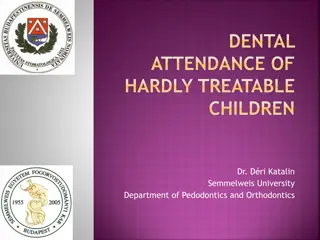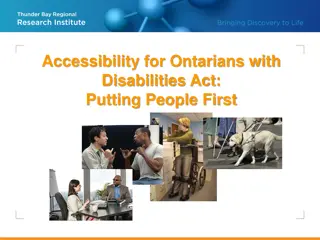Supporting Graduate Students with Disabilities: University's Accommodation Process
The Center for Students with Disabilities (CSD) at the University facilitates an interactive and individualized process to provide appropriate accommodations for graduate students with disabilities. The CSD is authorized to engage in this process according to Section 504 of the Rehabilitation Act and the Americans with Disabilities Act. As of October 1, 2021, around 9% of registered students are graduate students, with the top three disability categories being psychiatric conditions, chronic health conditions, and ADHD. Admitted students are required to register with MyAccess, provide evidence of their disability, and participate in determining suitable accommodations.
Download Presentation

Please find below an Image/Link to download the presentation.
The content on the website is provided AS IS for your information and personal use only. It may not be sold, licensed, or shared on other websites without obtaining consent from the author.If you encounter any issues during the download, it is possible that the publisher has removed the file from their server.
You are allowed to download the files provided on this website for personal or commercial use, subject to the condition that they are used lawfully. All files are the property of their respective owners.
The content on the website is provided AS IS for your information and personal use only. It may not be sold, licensed, or shared on other websites without obtaining consent from the author.
E N D
Presentation Transcript
Supporting Graduate Students with Disabilities The Graduate School s Timely Topics Series Jennifer Lucia, Associate Director, Center for Students with Disabilities Cinnamon Adams, Director of Graduate Student and Postdoctoral Support, The Graduate School October 6, 2021
Center for Students with Disabilities Email: csd@uconn.edu Phone: (860) 486-2020 Website: www.csd.uconn.edu
CSD Authority The Center for Students with Disabilities (CSD) is vested by the University with the authority to engage in an interactive process with each student and determine appropriate accommodations on an individualized, case-by-case, class-by-class basis. This practice is in accordance with Section 504 of the Rehabilitation Act of 1973 and Title II of the Americans with Disabilities Act (ADA) as amended (2008), which provides that no qualified person will be denied access to, participation in, or the benefits of, any program or activity operated by the University because of a disability.
Students As of October 1, 2021 4,264 students registered with CSD ~380 graduate students (9%) Top 3 categories of disability: Psychiatric Conditions Chronic Health Conditions Attention Deficit Hyperactivity Disorder
CSD Process for Admitted Students INTERACTIVE AND INDIVIDUALIZED PROCESS Register with MyAccess Assigned a Disability Service Professional (DSP) Student provides evidence of disability: Self-report, CSD professional judgment and Documentation Meet with the DSP Determination of disability Determination of appropriate accommodations and adjustments Implementation of accommodations by CSD and faculty
Student Responsibilities Meet the University s qualifications and essential technical, academic, and institutional standards, including the Student Code. Identify oneself as an individual with a disability to the CSD when seeking an accommodation (Register via MyAccess). Provide evidence of the condition(s) for which they are seeking accommodations. Participate in the interactive process with CSD staff, faculty, and other University resources as indicated to obtain and coordinate reasonable and appropriate accommodations, academic adjustments, policy modifications, and/or auxiliary aids and services.
Faculty Responsibilities Discuss with CSD any concerns related to accommodations that have been approved for a student (fundamental alteration). Assure appropriate accommodations are provided, either by providing the accommodations themselves or through a TA, or by making appropriate arrangements with the CSD. Assist the student in contacting the CSD when no official notification regarding accommodations has been received from the CSD. Ensure that course and department materials are accessible.
CSD Responsibilities Engage in an interactive process and determine reasonable and appropriate accommodations, academic adjustments, policy modifications, and/or auxiliary aids and services for students with disabilities. Notify students and their faculty (and other teaching professionals, such as Teaching Assistants) of approved academic accommodations. Assist students in coordinating approved accommodations, academic adjustments, policy modifications, and/or auxiliary aids and services, which are determined on a case-by-case, course-by-course basis. Maintain privacy of records and communication concerning students with disabilities except where disclosure is required by law or authorized by the student. Inform students with disabilities of University policies and procedures for filing a formal grievance through the Office of Institutional Equity and/or through external agencies (e.g., Office of Civil Rights).
UConns Responsibilities Ensure that University courses, programs, services, jobs, activities, and facilities, when viewed in their entirety, are offered in the most integrated and appropriate settings. Adapt existing requirements on a case-by-case basis in order to ensure that individuals with disabilities are not discriminated against on the basis of disability. Postsecondary institutions are not required to: Reduce, waive or modify any of the essential requirements of a course or program Conduct testing or assessment of learning, psychological or physical conditions Provide personal assistants or private tutoring
Accommodations The purpose of accommodations and modifications is to reduce or eliminate any disadvantages that may exist because of an individual s disability. Accommodations are not a guarantee for success, but rather seek to promote non-discrimination and equal access opportunities. Accommodations are not student preferences; they are determined through an established review process based on evidence received regarding the student s disability. The law does not require institutions to waive specific courses or academic requirements considered essential to a particular program or degree. Rather, they are mandated to modify existing requirements on a case-by-case basis in order to ensure that individuals are not discriminated against on the basis of their disability. Faculty and other teaching professionals may have input into the means of implementing an approved accommodation, but they may not refuse to provide accommodations approved by the CSD. Accommodations are not retroactive. Faculty should not request documentation of a student s condition - any documentation should be provided to the CSD.
Academic Exceptions Academic Exceptions (AE)- these are academic decisions made by instructor, department, School/College When a medical/health matter does not rise to level of accommodation, but an AE may be considered, Center for Students with Disabilities (CSD) can collect medical paperwork to confirm Should be applied consistently, guidance in syllabus Examples that you have provided?
Examples Last minute requests for time extensions Two days before the exam, the student requested from all 3-course faculty to take exams later due to her daughter coming down with COVID. The day before this request, the student had met with the Director for assistance with summer registration and course selection but had made no mention of this need. Two of the three faculty denied the request. One extended some time. Students not performing well on exams communicate the need for accommodations The student took the exam, didn t do well, and then communicated to the faculty that they should have been granted accommodations. The student registered with CSD at the start of the semester, but the student hadn t followed up with CSD about accommodations in the course. Therefore, the information was not shared with the faculty until after the exam. The student took the exam, didn t do well, and communicated to the faculty that he should have had accommodations. He had been approved for it in his undergrad but felt he could manage without it for his grad career and didn t apply for it. Even though there was no supported accommodation, he requested accommodation to retake the exam. The faculty did extend the accommodation but advised the student to apply for the accommodation to use in courses in the future.
Resources Center for Students with Disabilities- Instructional Strategies; For students requesting accommodations Center of Excellence in Teaching and Learning: Creating Accessible Classroom and Courses An inclusive classroom works on the premise that students with disabilities are as competent as students without one. Educational Equity for Students with Disabilities: Insider Higher Ed: blog, September 28, 2021 Human Resources- Accommodations for graduate assistants Office of Institutional Equity: Accessibility- Faculty/Staff Resources Student Health and Wellness (SHaW): Mental Health Services Student Behavioral Health Service (UConn Health students) The Graduate School- Graduate Student and Postdoctoral Affairs- Support for graduate students navigating the processes available Timely Topics presentations past and future
Questions Jenn Lucia- Jennifer.lucia@uconn.edu Cinnamon Adams- cinnamon.adams@uconn.edu
Timely Topics From Expectations to Evaluations: The Importance of Timely Feedback with Provost Lejuez Wednesday, October 20, 2021 1:30pm-3pm Register View All Timely Topics Events
Timely Topics Using Annual Reviews to Help Graduate Students Succeed Wednesday, October 27, 2021 1pm-2pm Register View All Timely Topics Events
GradSlate Training GradSlate is The Graduate School s CRM and admissions software. Learn more about how your department can use it during this year s GradSlate Training Series. Register for GradSlate Trainings Admissions and Recruitment Info
